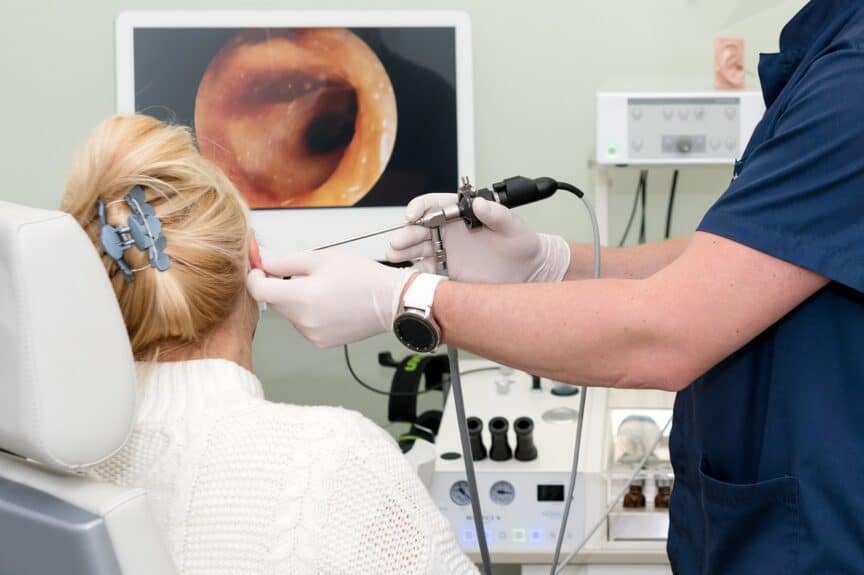Are you tired of feeling like you’re living in a fishbowl? Is the world sounding a little too muffled for comfort? If so, you may be experiencing the frustrating sensation of clogged ears. But why does this happen, and what can you do about it? In this post, we’ll explore the common causes of clogged ears, how to treat them, and when to seek medical attention. So, let’s dive in and learn about this annoying condition.
Common Causes of Clogged Ears
The most common symptom of clogged ears is muffled hearing. This can range from a slight reduction in sound clarity to a complete loss of hearing in one or both ears. Tinnitus, or a ringing in the ears, is also a common symptom of clogged ears. Dizziness, pain, and a feeling of fullness in the ear are also possible symptoms. In some cases, clogged ears can lead to itching and irritation of the ear canal.
One of the most common causes of clogged ears is a buildup of earwax. This occurs when the ear produces more wax than it can remove naturally. The excess wax can accumulate in the ear canal, blocking sound waves from entering the ear. Removing earwax with Q-tips can often make the problem worse, as it can push the wax further into the ear canal.
Changes in air pressure can also lead to clogged ears. This can happen during air travel, when the pressure inside the ear cannot equalize with the pressure outside the ear. Similarly, when driving in the mountains, the change in altitude can cause the same sensation.
Allergies and sinus infections are another common cause of clogged ears. These conditions cause inflammation in the nasal passages and Eustachian tubes, which can prevent the equalization of pressure between the ear and the outside world.
Trapped water is yet another cause of clogged ears. Swimmers are particularly susceptible to this, as water can become trapped in the ear canal and lead to a temporary blockage.
Finally, infections of the ear, such as otitis media or swimmer’s ear, can lead to clogged ears. These infections are typically caused by bacteria or viruses and can cause inflammation, pain, and hearing loss.
How to Treat Clogged Ears
If you are experiencing clogged ears due to earwax buildup, it’s important to avoid using Q-tips or other objects to try and remove the wax. This can push the wax further into the ear canal and potentially cause damage to the eardrum. Instead, consider using over-the-counter ear drops designed to soften the wax and facilitate its natural removal. Alternatively, a doctor can perform an ear irrigation procedure to safely remove the excess wax.
Home remedies can also be effective in treating clogged ears. Applying a warm compress to the affected ear can help to soothe inflammation and reduce discomfort. Olive oil can also be used to soften earwax and facilitate its removal.
If your clogged ears are due to allergies or sinus infections, it’s important to treat the underlying condition. Over-the-counter allergy medication or decongestants can be effective in reducing inflammation and equalizing pressure in the ear. If symptoms persist, a doctor may prescribe stronger medication or recommend other treatments such as nasal sprays or antibiotics.
When to Seek Medical Attention
In some cases, clogged ears can be a sign of a more serious condition that requires medical attention. If you are experiencing severe pain or bleeding, sudden hearing loss, or dizziness and vertigo, it’s important to seek medical attention immediately. These symptoms may be a sign of an infection or other medical issue that requires prompt treatment. Similarly, if your symptoms persist despite at-home remedies or medical treatment, it’s important to consult with a doctor to ensure that there is not an underlying issue that is causing the blockage.
Prevention of Clogged Ears
Prevention is always the best medicine, and there are steps you can take to prevent clogged ears. Regular ear cleaning, such as wiping the outer ear with a washcloth, can help to prevent earwax buildup. If you are exposed to loud noises regularly, consider wearing earplugs or other hearing protection to prevent damage to your ears. When swimming or showering, make sure to protect your ears by using earplugs or a swim cap to prevent water from becoming trapped in the ear canal. Finally, it’s important to treat allergies and sinus infections promptly to prevent inflammation and infection from spreading to the ear.
Clogged ears can be an annoying and uncomfortable condition, but there are steps you can take to treat and prevent it. Whether the cause of your clogged ears is earwax buildup, changes in air pressure, allergies, or infections, there are a variety of remedies available to provide relief. If you are experiencing severe symptoms or your symptoms persist despite treatment, it’s important to seek medical attention.
At our hearing practice, we are dedicated to helping our patients maintain healthy ears and hearing. If you are experiencing clogged ears or any other hearing issues, we encourage you to schedule an appointment with us today, as we may be able to help. Together, we can help you enjoy the world of sound around you.

